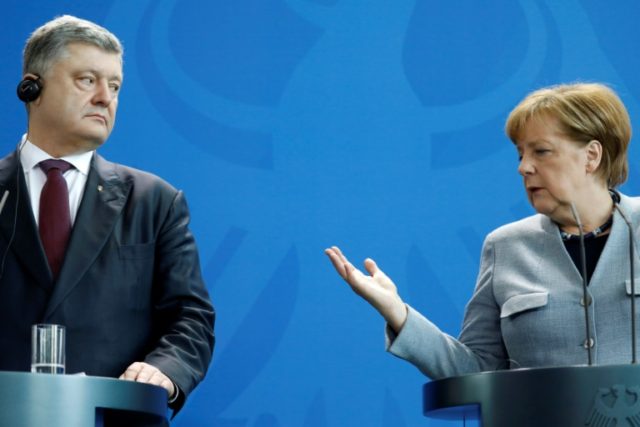Berlin (AFP) – German Chancellor Angela Merkel said Tuesday that plans for a controversial second underwater pipeline to bring gas from Russia could not go forward without Ukrainian involvement in overland transit.
After months of tension with eastern neighbours and the European Commission over the so-called Nord Stream 2 project, Merkel’s concession to Kiev’s grave concerns marks a striking shift in policy.
“A Nord Stream 2 project without clarity about the Ukrainian transit role is not possible,” Merkel said, after talks in Berlin with Ukrainian President Petro Poroshenko.
The German leader said the pipeline plans, which have long thrown a wrench in bilateral ties, had played a big role in their discussions.
Merkel, who had previously called Nord Stream 2 a purely “economic project”, admitted Tuesday there were “political factors that must be taken into account”.
She added that in her talks with Poroshenko, “I listened closely to the concerns of Ukraine”.
“The fact is that we cannot allow that, with Nord Stream 2, Ukraine would have no significance at all any more with regard to gas transit,” Merkel told reporters at a joint press conference.
She noted that while there would “always be dependence on Russian gas”, Ukraine relied heavily on income from transit fees.
– ‘Extremely unreliable partner’ –
In an interview with German business daily Handelsblatt on Monday, Poroshenko urged Berlin to abandon plans to build Nord Stream 2, saying it would enable an “economic and energy blockade” against Ukraine and blasting it as “political bribe money for loyalty to Russia”.
The pipeline as planned would double the amount of Russian gas arriving in the European Union’s most powerful economy via the Baltic Sea — without transiting Ukraine — by late 2019.
Authorities in Germany issued the final permits needed for construction of Nord Stream 2 on its territory and in its waters to begin last month, although other nations’ green lights are still needed.
But “the Ukrainian transit pipeline is much cheaper and can be modernised cheaply and easily,” Poroshenko insisted in the Handelsblatt interview.
He accused Russia of being an “extremely unreliable partner” in energy provision, pointing to state-owned energy firm Gazprom’s refusal to pay Ukraine billions of euros after shutting off gas supplies in the middle of winter.
Ukraine has also urged sanctions against former German chancellor Gerhard Schroeder over his vocal support of the Russian government and $500,000-a-year job on the board of Russian state-owned oil giant Rosneft, calling him “(Russian President Vladimir) Putin’s most important lobbyist”.
– ‘Question our solidarity’ –
Gazprom accounts for around one third of Europe’s gas supply.
Less and less gas has arrived via Ukraine in recent years, part of Moscow’s conflict with its former satellite which saw Russia annex the Crimean peninsula in 2014 — prompting EU sanctions in response.
The project has also proved a bone of contention within Germany itself.
A rare cross-party alliance of high-ranking German politicians from Merkel’s Christian Democratic Union, the environmentalist Greens and pro-business Free Democrats warned in February against allowing Nord Stream 2 to go ahead.
It would “split the EU politically and call into question our solidarity with Poland, our Baltic neighbours, Slovakia and Ukraine, but also Sweden and Denmark,” they wrote.
During a visit to Berlin in February, Polish Prime Minister Mateusz Morawiecki cautioned that a single gas producer — Russia — must “not be allowed to have a monopoly and force its prices on the European Union”.
During their press conference, both Merkel and Poroshenko denounced repeated violations of a ceasefire in eastern Ukraine, with Merkel calling progress in reducing tensions “limited”.
The armed conflict between the Ukrainian army and Russian-backed rebels has claimed more than 10,000 lives since its outbreak in 2014.
Kiev and the West accuse Russia of supporting the separatists by deploying troops and arms, which Moscow denies despite evidence to the contrary.
A string of ceasefire deals have helped to reduce the violence but nevertheless sporadic clashes still erupt between the warring sides.

COMMENTS
Please let us know if you're having issues with commenting.